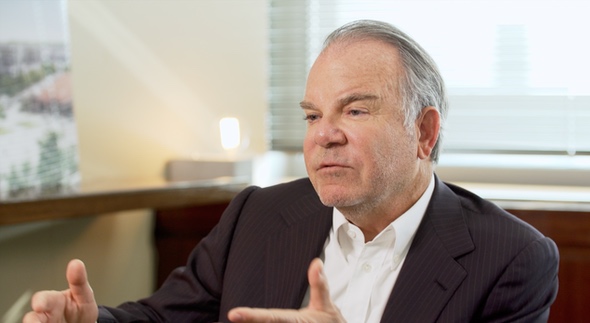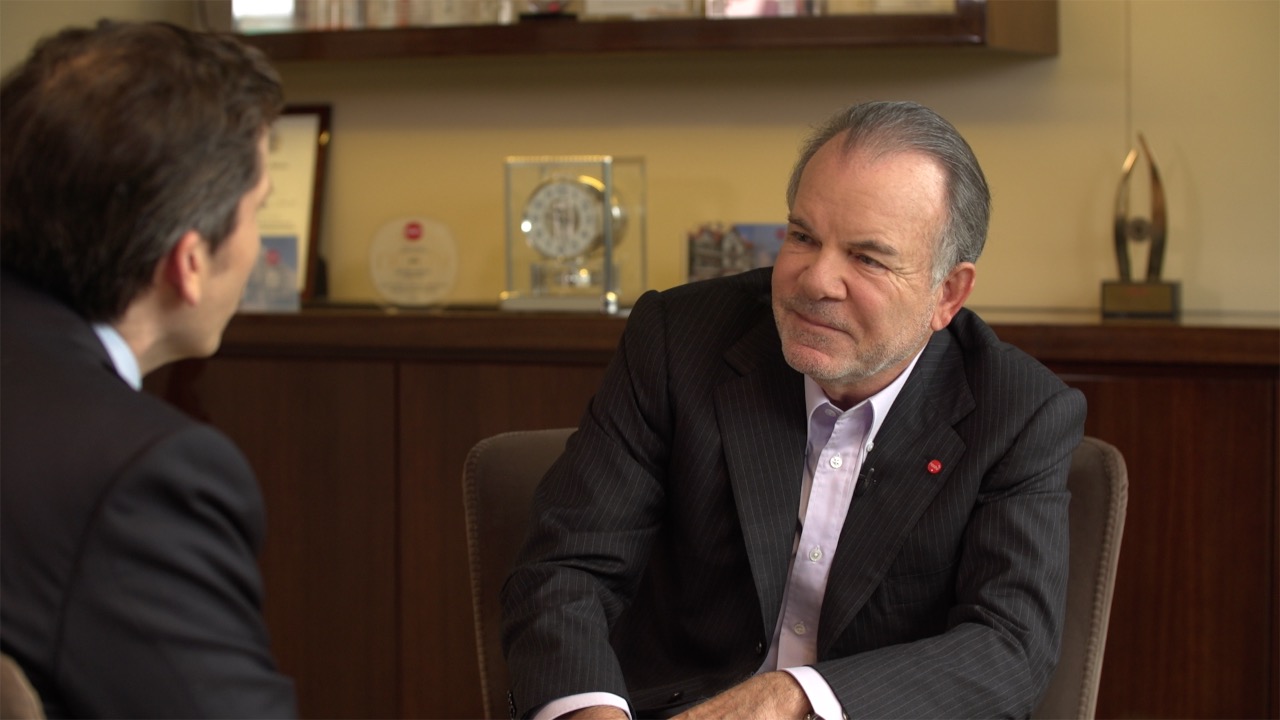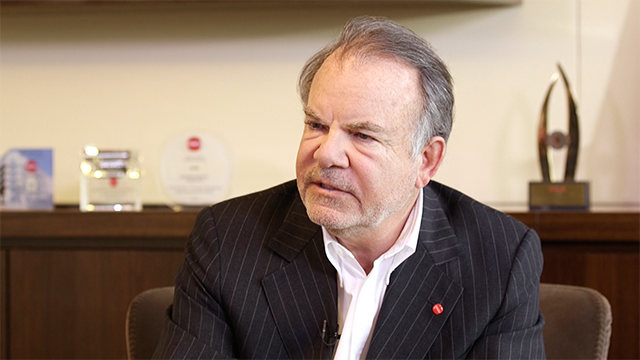Eurobusiness Media (EBM): Nexity, France's leading integrated real-estate company, has published its 2018 annual results. Today we have the pleasure of speaking with its Chairman and CEO. Alain Dinin, Good morning.
Alain Dinin: Good morning. First, we do not work directly in real-estate business; we are a company that provides real-estate services. This distinction is very close to my heart. It may sound contradictory, but we are not “in” real estate since we do not own any real-estate assets as Nexity. We are a company providing services for our clients. We made the transformation four years ago. We pivoted towards a service-platform structure. That being said, the industry is performing well, as are the Group’s business lines within it. The results speak for themselves: revenues are up 16% and EBITDA is up 14%. We are even in a position to forecast and offer the market our results for the next three years.
EBM: So how far have you got in this transformation towards a service platform?
Alain Dinin: The service platform is first and foremost a client-oriented tool. Nexity has three client categories: first, local authorities are a natural partner. When one builds housing, office space or work in real estate more broadly, local authorities play a central role. So we need to be a partner with them. The second category is Commercial Clients, who require a lot of involvement; they call for a lot of effort. For instance, just this year we took a majority stake in a co-working business called Bureaux A Partager ("Offices to Share"). Thirdly, we are France's primary property-management operator, managing 11 million square metres, and we operate end-to-end in the housing segment: from social housing for families on benefits, where the goal is not to make profits but help people live, to solutions for the elderly who do not require resident nursing care, with a majority stake in Aegide-Domitys. We operate in all these areas, and the services platform is the nexus of all these clients and business lines. Is this easy? Of course not. Do we need to change individuals and organizations? Naturally we do, and at the same time, since our businesses work well–as you are aware, in many of these business lines we have a strong order book in housing. In the property management for individuals business there is a form of resilience and recurrence. Our order book has grown to 4.5 billion, which corresponds to two years of revenue ahead of us. Also, the business outlook enables us to push even further ahead with our company's transformation. The shift is not yet effective everywhere, but the signs are promising and the financial markets are starting to factor it in.
EBM: Speaking of this, what is your outlook for 2019?
Alain Dinin: For 2019, we told the market we would increase revenues and results by at least 5%. Bear in mind that a single year's earnings have relatively little significance; what is important is the trend. The trend indicates that, between 2018 and 2021, we will have compound annual growth of 10% both in revenues and EBITDA. What are the implications of this? This means that in 2021, we will be close to €700 million in EBITDA and we are well-placed today, as a company facing the complexities of the modern world, with all its challenges, perhaps a real-estate cycle or interest rates, or other contingencies... because the group’s organization is rapidly expanding but structured on proper industrial lines, we can confidently announce "here our earnings for the next three years." It's up to us to do better. It's up to us not to disappoint. A year with 5% growth does not mean that the next year will be worse or that this forecast will not be fulfilled. We confirm our targets. We are paying a dividend of €2.50 and, in the medium term, we will be guided by a strategy of seeking to make Nexity a company that serves the world in which it operates. Perhaps even, one day, a mission-led company.
EBM: Can you tell us a little more about the main elements of the strategic plan?
Alain Dinin: The main elements are the contribution of all these consistently operating business lines in the service of our customers. That said, day-to-day as English speakers say, in our daily work, there is much to do. Our strategy is to be of use in this fast-changing world. This means being agile. We are therefore a company comprised of many, perhaps of too many businesses—more than 50 business lines, a flotilla of activities that are flexible, have a regional foothold, are anchored to their customers, and at the same time organised strategically so as to control cash flows. All of this is the work we perform, and it's our strategic plan. In essence, our aim is to become an indispensable company. One day, when something comes up in your daily life (office, housing, business), you’ll think “I’ll check Nexity“ before looking further.
EBM: You recently announced a change in governance. Can you explain what it means for Nexity, and tell us about your new organisation?
Alain Dinin: In a nutshell, the change in governance is that today, I am Chairman & CEO of Nexity. On 22 May, after the general meeting, if that meeting approves and renews my appointment as director, I shall be only this company's Chairman. The CEO post will be filled by Jean-Philippe Ruggieri who has been at my side for fifteen years, and who is the Nexity’s Individual client specialist; he will also be supported by a team of senior managers. His role is a “first among equals” in a team of four: Véronique Bedague-Hamilius for Local authorities and Commercial Clients, Julien Carmona for Internal Clients and everything related to strategy and development, then there is Frédéric Verdavaine who has the biggest headcount, big organisations in the service business including Aegide-Domitys, the student-residence business, and various aspects of property-management business. This team operates on a collegiate basis. The team requires a primus inter pares, namely Jean-Philippe Ruggieri; he will be appointed on 22 May, and if approved by the general meeting, he will be appointed CEO and I will be Chairman, which will change my involvement in the company. I shall be Chairman for my four-year term of office. I am the representative of a concert group holding 20% of the company’s capital so I shall remain the shareholder representing this company's largest body of shareholders. In this respect, my objective is generating value growth and, as a result, I have asked the Board of Directors–which has consented – to propose to the general meeting–the widening of my powers as Chairman. I shall keep a guiding hand on the company, its strategy, its financial commitments, personnel choices, operating above board, obviously under the control of the Board of Directors and in agreement with General Management, so as to allow this company to propel itself into future and forge the next strategic plan. We’ll be working on it. When we are ready, we will present it to the market, I will still have a presence, but in the end I am planning to devote my time to the most important matters and be less occupied with day-to-day operations of the company, that have become so complex that in the end I need a close-knit team. This style of governance marks a significant change. It is neither a succession nor a replacement. It's a major step in preparation for a transition. My term of office lasts four years. I'm here for four years. There is no need to worry. In any case, the teams and I have been working on this together for several months and we are very much in sync in moving this company forward and generating the growth of the forthcoming years, which may not match the growth in the last five years, in which the business virtually doubled – to double that again would obviously be difficult–but we are on-track with this strategy of propelling our company towards its future and such is the organizational scheme that I have chosen.
EBM: Alain Dinin, thank you very much.
Alain Dinin: Thank you.




